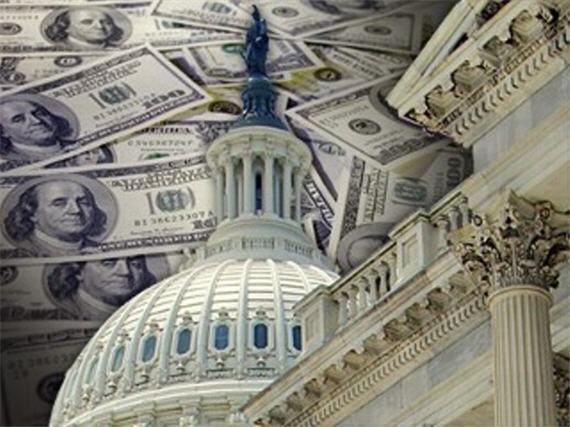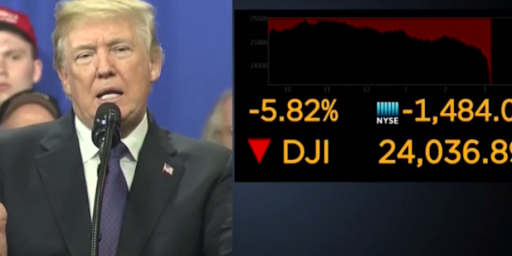Congress and Insider Trading
Congressmen are investing hundreds of millions of dollars in stock in companies over which they have oversight. And it's perfectly legal.
Congressmen are investing hundreds of millions of dollars in stock in companies over which they have oversight. And it’s perfectly legal.
WaPo (“Members of Congress trade in companies while making laws that affect those same firms“):
One-hundred-thirty members of Congress or their families have traded stocks collectively worth hundreds of millions of dollars in companies lobbying on bills that came before their committees, a practice that is permitted under current ethics rules, a Washington Post analysis has found.
The lawmakers bought and sold a total of between $85 million and $218 million in 323 companies registered to lobby on legislation that appeared before them, according to an examination of all 45,000 individual congressional stock transactions contained in computerized financial disclosure data from 2007 to 2010.
Almost one in every eight trades — 5,531 — intersected with legislation. The 130 lawmakers traded stocks or bonds in companies as bills passed through their committees or while Congress was still considering the legislation. The party affiliation of the lawmakers was almost evenly split between Democrats and Republicans, 68 to 62.
Sen. Tom Coburn (R-Okla.) reported buying $25,000 in bonds in a genetic-technology company around the time that he released a hold on legislation the firm supported. Rep. Ed Whitfield (R-Ky.) sold between $50,000 and $100,000 in General Electric stock shortly before a Republican filibuster killed legislation sought by the company. The family of Rep. Michael McCaul (R-Tex.) bought between $286,000 and $690,000 in a high-tech company interested in a bill under his committee’s jurisdiction.
The trades were uncovered as part of an ongoing examination by The Post of the intersection between the personal finances of lawmakers and their professional duties. Earlier this year, Congress responded to criticism of potential conflicts of interest by passing the Stock Act, which bars lawmakers, their staffs and top executive branch officials from trading on inside information acquired on Capitol Hill.
But the act failed to address the most elemental difference between Congress and the other branches of government: Congress forbids top administration officials, for instance, from trading stocks in industries they oversee and can influence. The lawmakers, by contrast, can still invest in firms even as they create laws that can affect the bottom line of the companies.
“If you have major responsibility for drafting legislation that directly affects particular companies, then you shouldn’t be trading in their stock,” said Dennis Thompson, a professor of public policy at Harvard University’s John F. Kennedy School of Government and author of “Ethics in Congress: From Individual to Institutional Corruption.” “Committee chairs especially shouldn’t be in the position of potentially benefiting from trades in companies that stand to gain or lose from actions the committee takes.”
The Post analysis does not provide evidence of insider trading, which requires showing that lawmakers knowingly used confidential information to make trades benefiting themselves. Instead, the review shows that lawmakers routinely make trades that raise questions about potential conflicts and illustrate the weaker standard that Congress applies to itself.
Foreign Policy managing editor Blake Hounshell, who pointed me to the story, declares, “Congress is disgusting. Americans should be outraged at this kind of stuff.” While I’m not sure I’d go that far, this is certainly a situation where an obvious conflict of interest exists and yet another case where Congress applies one set of rules to itself and another to the rest of us.
To be sure, an individual member of Congress has less influence over policy than, say, a cabinet secretary. There are, after all, 435 Representatives and 100 Senators and we have a cumbersome legislative process requiring bills to pass through both Houses in identical form and get signed by the president before becoming law. Still, committee chairmen and other Members have enormous influence. Even, even if we were to presume that all of them are of the highest integrity and would never vote against the interests of their constituents for personal profit–work with me here–it’s not right that they should be able to buy and sell stocks on inside knowledge, behavior that is criminal when done by anyone else.
What’s also interesting is that, even if we take the low end figure of $85 million, that’s a lot of investing by 130 Members–and that’s only money directly going in to companies where they have regulatory oversight. That means they’re each investing on average $653,846.15–some four times their average annual salary. Granting that some Members come to Congress as multi-millionaires and the study includes “families” in the mix, that’s at the very least worthy of a raised eyebrow.
It’s often been said that the real crime is what’s legal. This is a classic case.






I remember a study which said members of Congress had an average investment return of 30% per year.
No one has an average return of 30% per year.
Unless you cheat. It’s that simple.
@john personna: @john personna:
Yes. Which reminds me of this book title: “The Best Way to Rob a Bank Is to Own One.”
James- You should read this short bit at the link. Just a short bit, written by an economist from the London School of Economics and an MIT guy.
“We found that members of Congress generally perform no better than ordinary investors. Over the 2004-2008 period, the stock portfolio of the average member of Congress underperformed the market by 2 to 3 percent per year. Put another way, in a five-year period during which the market lost around 20 percent of its value, the average congressional portfolio lost over 30 percent. Even individuals whom Schweizer singles out for suspicious trades would probably have been financially better off if they had replaced their stock portfolios with a passive index fund.”
http://bostonglobe.com/opinion/2011/12/14/members-congress-use-insider-information/2dCmbAa6EdPwRzAi7B6UxJ/story.html
I think the optics on this are bad, and we should stop their insider trading, but you miss the real message. Even with inside information, members of Congress still underperform. Stop and think about that a bit and decide if that isnt more worrisome than the idea they might be making more money.
Steve
@steve:
A four year study?
Wouldn’t you want a 10, 20, or even 40 year comparison?
In a casual search I don’t see the 30% number I remember (and I don’t remember it’s timeframe), but here is an article which shows US houeholds averaging -1.5% returns while Senators earned 12.3% (corporate insiders 7.4%, House of Representatives 6%).
So be a Senator, if at all possible.
As G. K. Chesterton said, “It is terrible to contemplate how few politicians are hanged.”
@john personna:
Ah, it is key to note that the article I linked shows preformance relative to stock market indexes.
This is the key datum. Individuals underperform indexes, usually because they trade too often, or join trends too late. Professional money managers actually, over time, underperform indexes as well.
That congressmen can beat indexes, and beat them by large margins, is a smoking gun. Really.
@john personna:
To paraphrase Nixon, it’s not cheating when Congress does it.
Besides, how would be get the best to run for Congress if they couldn’t profit from the thieving. No one goes into politics just for the lying.
@JKB:
Sadly true.
Foxes guarding hen houses.
@JP- Did you look at the dates on the study you link. They do not coincide. I bet my returns from 93-98 were better than 91-96. Remember “it’s the economy stupid”?
Steve
@JP-You want the Ziobrowski study, which Megan summarizes at the link. AFAICT, there has never been a study with the 30% number you cite. I think that was a case of cherry picking individual trades.
Steve
@steve:
Since they are relative to an index, dates are not as important.
As I’m sure you know, underpeformance or overperformance is almost always reported versus the S&P 500 index. That’s standard operating procedure, and is what allows investment strategies or fund managers to be performed for non-contiguous timeframes.
I’m open to more data, but I think the body of studies show outperformance by members of congress. That’s what I saw in my google searches. Feel free to report more.
@JP- AFAICT, there are really only two studies. Megan does them here.
http://www.theatlantic.com/magazine/archive/2011/11/capitol-gains/8692/
Also, relative to an index, the time covered is important. If you compare one period when the overall market is very strong vs another when the market is down, there will be no meaningful comparison.
Steve
@steve:
No. Here is a book length treatment on this question. Another good one is here.
For what it’s worth, I’m not totally down on McArdle. I think her articles are only sometimes weakly defended sophistry. Putting so much on 4 years fits that pattern though.
To borrow another term from the fund tracking community, you can prove anything with data mining. The bad sense of that term is that you “mine” past confidence. You narrow in until what you have is noise.
Ah, I remember a couple more good books:
Against the Gods: The Remarkable Story of Risk
Irrational Exuberance
Those help paint the picture of what kinds of risks markets face, and why aggregates and indexes are so hard to beat.
One more!
The Myth of the Rational Market: A History of Risk, Reward, and Delusion on Wall Street
No, two more!
Your Money and Your Brain
Seriously, I enjoyed all these and hope you will too.
I don’t think it matters if they got better returns. What matters is the conflict of interest.
Congressmen will inevitably write legislation INTENDED to favor their investments, even if it doesn’t pay off.
Thats what the real corruption is about.
@Liberty60:
Sure, and that provides us with an easy path. The Federal Retirement Thrift Investment Board created the Thrift Savings Plan and wisely built it around index funds:
If we required congressmen to use the those fund, then they’d try to make those funds do well, benefiting us all.
Some people can’t see the forest for the trees. Try Googling the House Ethics Manual and it’s references to The Code of Ethics for the US Government.
The House Ethics Manual states in no uncertain terms (emphasis mine):
That ―public office is a public trust has long been a guiding principle of government. To uphold this trust, Congress has bound itself to abide by certain standards of conduct, expressed in the Code of Official Conduct (House Rule 23) and the Code of Ethics for Government Service. These codes provide that Members, officers, and employees are to conduct themselves in a manner that will reflect creditably on the House, work earnestly and thoughtfully for their salary, and THAT THEY MAY NOT SEEK TO PROFIT BY VIRTUE OF THEIR PUBLIC OFFICE , allow themselves to be improperly influenced, or discriminate unfairly by the dispensing of special favors. This chapter discusses the overarching principles that inform both codes, THE PENALTIES FOR VIOLATING THEIR PROVISIONS, and the history and procedures of the Committee on Standards of Official Conduct.
Insider trading violates the code of conduct in the House ethics manual and the code of ethics for the US government.
Now, can anyone out there show me the statute that makes it legal for members of Congress to engage in insider trading?
Coburn’s purchase coming just before he released a unilateral hold seems really egregious. Given the influence a single Senator can have those members should be subject to at least the same scrutiny as the executive.